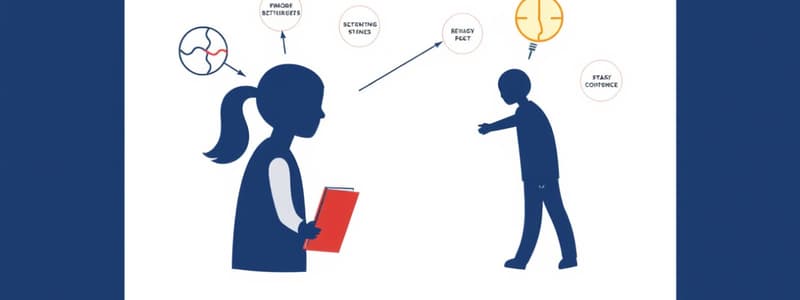Podcast
Questions and Answers
What can be inferred about the mean words recalled in a wet learning environment compared to a dry learning environment?
What can be inferred about the mean words recalled in a wet learning environment compared to a dry learning environment?
- Mean words recalled were higher in a dry environment.
- Mean words recalled were lower in both environments.
- Mean words recalled were the same in both environments.
- Mean words recalled were higher in a wet environment. (correct)
Which of the following was not identified as a factor affecting recall performance in the study?
Which of the following was not identified as a factor affecting recall performance in the study?
- Cognitive load (correct)
- Recognition ability
- Type of learning environment
- Mean words recalled
Why might recognition be better in a specific environment according to the study?
Why might recognition be better in a specific environment according to the study?
- It reduces memory interference.
- Longer study sessions are held.
- Environmental cues help retrieval. (correct)
- Familiarity with content improves recall.
What does the difference in mean words recalled suggest about studying in different environments?
What does the difference in mean words recalled suggest about studying in different environments?
What is the primary cognitive process being investigated in relation to the learning environments?
What is the primary cognitive process being investigated in relation to the learning environments?
In which learning environment was recognition found to be best during the study?
In which learning environment was recognition found to be best during the study?
What percentage is recognized in a wet learning environment according to the data?
What percentage is recognized in a wet learning environment according to the data?
Which cognitive process is emphasized for effective studying?
Which cognitive process is emphasized for effective studying?
What is the percentage recognized in a dry learning environment at its highest?
What is the percentage recognized in a dry learning environment at its highest?
What should be avoided to enhance encoding during study sessions?
What should be avoided to enhance encoding during study sessions?
Which recognition environment reported a lower percentage than the other?
Which recognition environment reported a lower percentage than the other?
At what percentage does recognition start in the wet environment compared to the dry environment?
At what percentage does recognition start in the wet environment compared to the dry environment?
What is a key strategy to improve memory retention during study sessions?
What is a key strategy to improve memory retention during study sessions?
Which of the following best describes free recall?
Which of the following best describes free recall?
How can one's self-schema influence their attitude towards studying?
How can one's self-schema influence their attitude towards studying?
According to studies, what explains the difference in performance between recall and recognition tasks?
According to studies, what explains the difference in performance between recall and recognition tasks?
Why might memory decline as individuals age?
Why might memory decline as individuals age?
What is the importance of evaluating one’s study technique?
What is the importance of evaluating one’s study technique?
What outcome might occur if students approach a memory task with a negative mindset?
What outcome might occur if students approach a memory task with a negative mindset?
What does 'deep encoding' refer to in the context of studying?
What does 'deep encoding' refer to in the context of studying?
What is one suggested activity to seek serenity before studying?
What is one suggested activity to seek serenity before studying?
Which type of interference occurs when old material affects new material?
Which type of interference occurs when old material affects new material?
What does 'deep processing' in studying refer to?
What does 'deep processing' in studying refer to?
Why is it important to study at the 'optimal' time of your day?
Why is it important to study at the 'optimal' time of your day?
What is a method of enhancing encoding mentioned in the content?
What is a method of enhancing encoding mentioned in the content?
What is the effect of music on studying according to the content?
What is the effect of music on studying according to the content?
Which statement is true regarding the semantic structuring of information?
Which statement is true regarding the semantic structuring of information?
In the context of reducing interference, what should one avoid during study periods?
In the context of reducing interference, what should one avoid during study periods?
What is considered the best approach for studying that leads to better learning and memory?
What is considered the best approach for studying that leads to better learning and memory?
According to cognitive processes, how does understanding context before studying impact memory?
According to cognitive processes, how does understanding context before studying impact memory?
Which study technique is considered to have low utility according to the discussed content?
Which study technique is considered to have low utility according to the discussed content?
What is the primary advantage of using the method of loci in memory techniques?
What is the primary advantage of using the method of loci in memory techniques?
What does the transformation process imply about learning?
What does the transformation process imply about learning?
Which of the following is NOT a component of the best study approach outlined in the content?
Which of the following is NOT a component of the best study approach outlined in the content?
What role does understanding the content play in the effectiveness of studying?
What role does understanding the content play in the effectiveness of studying?
Which technique requires a learner to structure their knowledge and form schemas?
Which technique requires a learner to structure their knowledge and form schemas?
Flashcards are hidden until you start studying
Study Notes
Study Techniques for Improved Memory
- Develop a self-schema to understand strengths and weaknesses, regardless of age.
- Emphasize learning for comprehension rather than merely collecting information.
- Contextual learning enhances memory retention; use environmental cues.
- Minimize interference from competing information to strengthen memory.
- Identify personal peak productivity times to optimize study sessions.
- Apply deep encoding techniques for better information retention.
- Prepare in advance for lectures and tutorials to enhance engagement.
- Regularly evaluate and refine study techniques to discover effective strategies.
Attitudes Toward Study
- Negative self-perception related to abilities can hinder performance (e.g., "I’m not good at statistics because I'm an arts student").
- Age-related beliefs about cognitive decline might impact confidence and performance.
Memory and Aging
- Neuronal changes occur throughout life, affecting memory capabilities.
- Aging may lead to less efficient memory recall due to cognitive shifts.
Active Recall vs Recognition
- Free recall involves producing items from memory, while recognition requires identifying learned items among new ones.
- Recognition is generally more successful than free recall due to additional retrieval cues.
Impact of Learning Environment
- Performance varies between dry and wet learning environments for both recall and recognition tasks, indicating context-dependent memory.
Encoding Strategies
- Eliminate distractions such as noise, television, and messages during study sessions.
- Silence is the most conducive for focused learning; music can be equally distracting.
- Engage in calming activities (walking, swimming) prior to study times for optimal mental state.
Types of Interference
- Retroactive interference occurs when new information affects the recall of previously learned material.
- Proactive interference happens when old information hinders learning of new material.
- Similarity of information can exacerbate interference issues.
Optimal Study Timing
- Determine your preferred learning time based on natural productivity rhythms (morning vs. evening preferences).
Deep Processing Techniques
- Utilize elaborative questioning to deepen understanding of material.
- Semantically structure information to facilitate better mental organization.
- Engage in self-referent encoding by linking new information to personal experiences.
Learning Transformation
- Effective study strategies involve transforming materials by summarizing and self-testing rather than relying solely on passive review.
- Best outcomes achieved with personalized notes and self-testing techniques.
Understanding Context
- Previous knowledge and context understanding before engaging with new material doubles memorization efficiency and reduces total study time required.
Visualization Techniques
- Utilize the method of loci (memory palace), a visualization strategy to complexly organize and recall information.
Evaluating Study Techniques
- Summarization as a study technique is more beneficial than mere copying but effectiveness can vary based on the learner's skill level. Overall, utility is considered low without proficient understanding and execution.
Studying That Suits You
Use AI to generate personalized quizzes and flashcards to suit your learning preferences.




